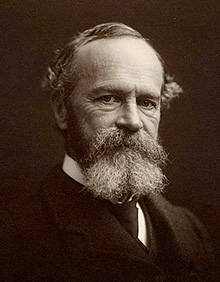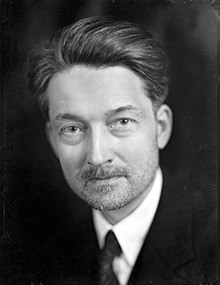
About Philosophy
About Philosophy

The term "Philosophy" has both a broad and a narrow meaning. According to William James, we all have a philosophy, by which he meant "our more or less dumb sense of what life honestly and deeply means. . . our individual way of just seeing and feeling the total push and pressure of the cosmos." Because many people acquire their own "philosophy of life" unreflectively, even unconsciously, from their parents and surrounding culture, philosophers have long both practiced and encouraged critical reflections on religious and cultural institutions. This is "philosophy" in the broad sense of the term.
One aim of studying philosophy at Creighton is to convert this unarticulated outlook on life, this "philosophy" in the broad sense of the term, into a carefully considered and conscientiously revised outlook--that is, a "philosophy" in the narrow sense of the term, an outlook that is disciplined, methodical, systematic, tested, comprehensive, and--ultimately--livable. The person who holds such a worldview can be said to be critically present in his or her culture, society, and political community and to be truly educated.
- Broadly: the Unreflected assumptions on which we live.
- Narrowly: Critically tested & justified beliefs on which we live.
"Criticism" in philosophy (in the narrow sense) thus means to be constantly curious. Academic philosophers ask questions of the broad sense of our cultural philosophies in a reflective and systematic way, examining various assumptions, methods, and concepts in order to discover their meaning and to see if there is "enough" evidence for accepting them as true.
This narrower sense of "philosophy" thus emphasizes critical reflection and understanding. Plato emphasized a difference between mere opinion and actual knowledge--the latter is grounded in reason. "Criticism" in philosophy does not mean censuring or fault-finding. Philosophy is "critical" in the sense that it raises questions about the most basic problems of human life. For example,
- What are we as human persons? What are minds?
- How ought we to live our lives? What is good?
- What should our relationships to other persons be? What is justice?
- What is the nature of the physical world? What is real?
- What should our relationship to the natural environment be?
- What can we know about God's existence? What can we know about God's nature?
- What is truth? What is beauty? What is freedom?
Not only does philosophy raise these questions, it seeks to answer them as well. This narrow sense of "philosophy" also attempts to unify these various analyses into a comprehensive and consistent understanding of reality. One important approach to achieving such a synthesis begins with an understanding of the history of philosophy, by which we acquire insight into the values, goals, and conflicts within our tradition. Philosophy pursues a dialogue of human persons across the centuries and across cultures.
Since philosophy involves the study arguments and how to assess evidence for controversial claims, it provides excellent preparation for Law School. Many Philosophy Majors do especially well in Medical School as well. There are also a number of non-academic careers that Philosophy Majors pursue.
One of the hallmarks of graduates of Jesuit universities is that they have encountered in a systematic and critical way, from the viewpoint of reason, the sorts of fundamental questions listed above. They have, thus sought to ground their previously unreflective beliefs with stronger reasons--in a sense, moving from the broad sense to the narrow sense of philosophy! Philosophy is eminently practical since these problems are always relevant and contemporary.
In all of the courses and program's of Creighton's Philosophy Department, the goal is the preparation of the student not for a job but for a lifetime of mature and reflective choices. To achieve this goal, Creighton philosophers teach students to develop skills of critical thinking and to appreciate the major movements of thought in Western civilization. The historical approach to philosophy emphasizes the relatedness of the philosophical problems of each age not only to that age's general cultural milieu but also to ours, engendering a sense of oneself as the product of a long and exciting intellectual adventure and producing a heightened self-awareness appropriate to an educated person. In all of the courses and program's of Creighton's Philosophy Department, the goal is the preparation of the student not for a job but for a lifetime of mature and reflective choices.
To achieve this goal, Creighton philosophy faculty teach students to develop skills of critical thinking and to appreciate the major movements of thought in Western civilization. The historical approach to philosophy emphasizes the relatedness of the philosophical problems of each age not only to that age's general cultural milieu but also to ours, engendering a sense of oneself as the product of a long and exciting intellectual adventure and producing a heightened self-awareness appropriate to an educated person.

Jacques Maritain said, "our practical decisions depend on the stand we take on the ultimate questions that human thought is able to ask." Thus, whatever "philosophy of life" one holds, whether critically or unreflectively, affects how we act and what we should do with our lives. We think such a formation is offered by our major and minor programs in philosophy.
Contact Information
Department Chair
Kevin Graham, PhD, Professor of Philosophy
Dowling Hall, Humanities Center, room 106
kgraham@creighton.edu
402.280.1219
Department Administrative Assistant
Abbie Uhlenkamp
Dowling Hall, Humanities Center, room 105
abigailuhlenkamp@creighton.edu
402.280.2834


